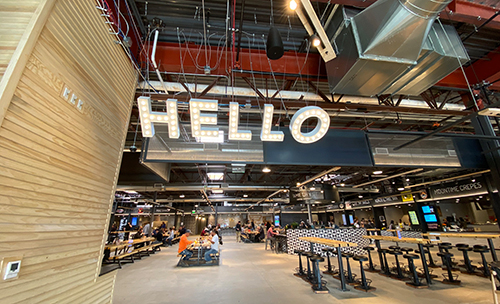 Ten years ago, the word “retail” could make even the most tenured broker cringe. Shopping centers across Colorado were experiencing vacancies and devolving into neglected eyesores and money pits. Many big-box retail stores were closing, and giant players were leaving the market.
Ten years ago, the word “retail” could make even the most tenured broker cringe. Shopping centers across Colorado were experiencing vacancies and devolving into neglected eyesores and money pits. Many big-box retail stores were closing, and giant players were leaving the market.
Today, as we look at Denver’s retail landscape, we see a new and exciting change that has been truly fascinating to witness and one that continues to evolve. Retail spaces are being developed and re-purposed in a more strategic way, one that marries consumer convenience with local businesses.
Food Halls and Public Markets
Food halls typically feature a variety of local food vendors under one roof with common-area seating; add retail shops and services to the mix, and you’ve got a marketplace. Colorado’s Front Range is currently home to 12 public markets and food halls, with more on the way. Starting with The Source in 2013, Denver’s list includes Avanti, Central Market, Stanley Marketplace, Locavore, and the newest Edgewater Public Market.
Many food halls are expansions of existing local restaurants or food trucks, benefitting both local businesses and consumers. Visitors have a variety of options to choose from in a more neighborhood-like setting, while businesses experience lower startup and overhead costs.
Eat-ertainment
Edgewater Public Market is a perfect example of a transformation from a formerly empty strip mall to a vibrant 50,000sf marketplace. Newly opened, this 6-acre campus takes the food hall concept a few steps further, incorporating retail and event space.
Honing in on the foodie “desire/obsession” that has swept the nation, Edgewater features 18 food and beverage vendors (many that started as food trucks) all under one roof. Ownership has restricted their food hall tenants to offer meals that will not exceed $15 per plate, to make the food offered affordable to most people. This selection and variety allows family members to each order whatever it is they are craving — a hamburger for the father, a gluten-free option for the mother, pizza for one of the kiddos, and fried chicken for another. The debate regarding what everyone wants for dinner has been eliminated.
And not everyone has to eat a full dinner: the open, common-area seating, and a-la-carte offerings make these venues ideal for people who are on different schedules to meet up for a snack, a full dinner, or just a drink.
Local, Social and Healthy
What makes Edgewater’s marketplace and other similar destinations even more innovative is that food is not the only draw. Marketplace concepts offer additional retail opportunities, such as liquor shops, flower stores, gift shops, clothing boutiques and jewelers. A thoughtful mix of local and artisan-based businesses can attract people looking for anything and everything. Social gathering and event spaces round out the offering; common seating areas can be located inside and outside, with lounge-like atmospheres and places to include the family pooch.
This synergy of destination services and entertainment wouldn’t be complete without including health and fitness. Growing throughout the U.S., but specifically imperative to health-conscious and active Colorado residents, these new “markets” will be sure to include either a choice or a collection of yoga, barre, cross-fit, spin and row classes. It seems now in the Front Range that within a five-mile radius, there will be a least one of these concepts, and they are becoming more abundant in these collaborative work and retail spaces.
The Restaurateur’s Dilemma
Another trend to note is that of the restaurateurs and food vendors. With Denver’s retail rents, property taxes and minimum wage on the rise, fine-dining establishments with a traditional larger footprint are having more difficulty turning a profit.
Restaurateurs operating 4,000sf plus sit-down, fine-dining concepts are justifiably cautious when considering opening another location of the same size. This creates the demand for smaller footprints where owners can maximize their profit and minimize their overhead.
Food halls also can offer entrepreneurs the opportunity to break into the food scene at a much lower capital commitment; a small kitchen and small staff allow rents and overhead to be fairly minimal. Having other businesses surrounding them will only increase their visibility and perhaps attract new customers.
The Art of Community
The intention of food halls and marketplaces is to get people to come and linger. Family outings, gathering with friends or coworkers, and happy hours are prime examples of activities for these target markets. Bringing people together that can spend an entire afternoon eating, shopping, working out and enjoying themselves is the purpose. And if the aforementioned draws aren’t enough, open spaces, dog parks and outdoor movie theaters are becoming retail development standards.
Lastly, everything new and hip in Denver must include art. Breathtaking, colorful, inspirational, fresh, creative and bold only begin to describe the murals popping up on the sides of buildings. As a result, vibrance and energy is seen not only to the physical space, but felt by visitors as well.
Check, Please!
At the end of the day, having every-day necessities in one retail location — one that is simply and aesthetically navigable, socially-oriented, and with a plethora of local options — is what influences a consumer to spend their retail dollars. Denver’s retail food hall and marketplace concepts are innovative examples that are meeting that need.
 Andrea Ackerman is Manager of Business Development at Wheelhouse Commercial in Denver, Colorado. For more information about how Wheelhouse Commercial can help manage your properties, please call 303.518.7406 or email info@wheelhousecommercial.com.
Andrea Ackerman is Manager of Business Development at Wheelhouse Commercial in Denver, Colorado. For more information about how Wheelhouse Commercial can help manage your properties, please call 303.518.7406 or email info@wheelhousecommercial.com.

